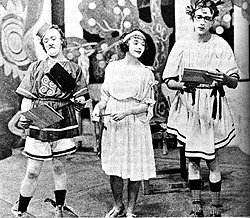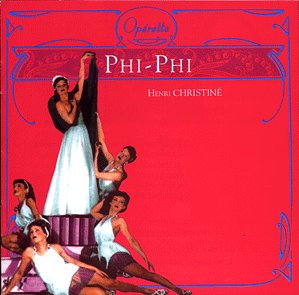This
rare recording of Phi-Phi comes
as part of an Operette series of re-releases
from Universal France. Max de Rieux
was the inspiration behind these recordings,
put together in the 1950s and 1960s
in a bold attempt to provide an archive
of forgotten French musical theatre.
Only
two songs of Christiné are to
be found in the CD catalogue today so
this re-release is particularly welcome.
Traubner's book on Operetta speaks highly
of Christiné and the qualities
he suggests are borne out in this recording.
Perhaps the term 'operetta' is incorrect
for this must surely be regarded as
one of the first comic musicals of the
century. The music contains those theatrical
and orchestral elements often associated
with stage musicals of the 1920s.
Henri
Christiné spent much of his life
in France yet was a native of Switzerland,
the son of a Geneva watchmaker. He turned
to music after marrying a local singer
and started writing songs for her. Christiné
first moved first to Brussels where
he presented his first operettas and
then to Paris where he worked as theatre
conductor and writer of this new wave
of operetta.

Phi-Phi opened directly after the
First World War. It took three months
to establish itself as a respectable
work, but by Spring 1919 bookings were
secure and filling the Bouffes-Parisiens
theatre. It then went on to become one
of Paris's longest-running shows.
The
amusing plot set in ancient Greece concerns
the domestic entanglements of Phidias,
a Greek sculptor (known as Phi-Phi).
Traubner describes the work as ‘opera-bouffe’,
containing risqué dialogue that
revels in puns and anachronisms. Two
young Greeks model for the sculptor
who falls for the girl while his wife
falls for the youth. The plot attempts
to explain the loss of Venus de Milo's
arms as well as characteristics of other
classical sculptures!
Phi-Phi's
songs and dance rhythms were so up-to-date
the piece might well be regarded as
a revue. Certainly, the bubbly joviality
was just right to release the tension
of the previous four years' war. The
score clearly anticipates the musicals
of the 1920s just around the corner
and shortly to be written. Try CD1 tk.3
with its catchy chorus number and you
will ask yourself if this could have
been written so early.
The
music is succinctly written and the
orchestration is light. The extended
finales generally associated with operetta
have now gone and are often replaced,
as here, by an ensemble number instead.
Max
de Rieux assembled a good cast and found
the right recipe for a good performance:
the cast certainly revel in their exploits.
As Phi-Phi, Max de Rieux comes across
confidently as the pivotal character.
Colette Riedinger is well suited to
Christiné's music and portrays
Phi-Phi's wife with the right amount
of verve. Aspasie is an important character,
singing the majority of the solo numbers.
Mireille provides the necessary chic
and perkiness, with a clear melodic
voice for this part. She is well suited
to play opposite Phi-Phi. Bernard Alvi
commands a strong presence with his
amorous overtures to Madame Phidias
[CD2 tk.3].
The
recording is first class, giving optimum
clarity to the voices, yet it does not
mask the nuances in accompaniment. The
music bounces along and one can visualise
a sparkling spectacle on stage to match.
Bervilly's direction is expressive and
he gets the best from the musicians
and singers alike. This is specially
noticeable in the superb playing to
the Act II finale [CD2 tk.4].
Notes
in French are provided in an attractive
card case that matches the rest of the
series rather than the insignificant
plastic jewel box.
Raymond
Walker
Operette
series from Universal Accord reviewed
by Ray Walker
Further reading :"Operetta",
Traubner (Routledge 2003); "Le Théâtre
des Annees folles" (Editions du Milieu,
Geneva 1943)
Phi-Phi at the London Pavilion (1922)
in an altered version of the Paris
production (1918) Traubner

